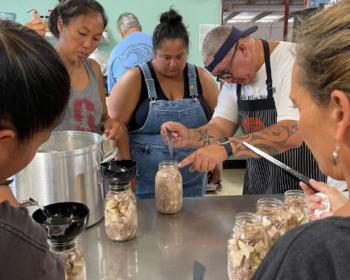
By Tia-Alexi Roberts (Narragansett, CS Staff)
Cultural Survival joined representatives of more than 275 Tribes, villages, and Indigenous communities at the National Tribal and Indigenous Climate Conference, held September 9-12, 2024, in Anchorage, Alaska. Over the course of four days, the conference attracted some 800 attendees both in-person and virtually. The event was organized by the Institute for Tribal Environmental Professionals.
Relatives, partners, and colleagues from around the globe gathered to exchange knowledge on their initiatives addressing climate impacts on their communities, natural environments, and non-human relatives, organized around the theme of ”Shared Responsibility for Indigenous Climate Resilience.”
The lineup of knowledge keepers and plenary speakers included Charitie Ropati (Yup’ik/ Samoan), Llegvak (Yup’ik), Cukayaq (Della Carl/Newtok), Jackie QatalińiaSchaeffer (Iñupiaq), Angute ‘Karaq Qakvalria/Estelle Thompson (Native Village of Paimiut), Jody Potts Joseph (Han Gwich’in, Trondek Hwechin First Nation), Jessica Ross (Dena’ina Native Village of Eklutna), Vera Kingeekuk Metcalf (Yup’ik), Na’ni’eezh Peter (Neetsaii Gwich’in and Diné), Theresa Yellowbear Tsoodle (Wichita, Pawnee, Diné, Apache, Creek, Seminole), and Walter Nelson (Napakiak).
A key aspect of the event was the sharing and honoring of Traditional and Indigenous Knowledge, with the notable synergy between community-led initiatives and State agencies highlighting the importance of partnership in addressing climate challenges. The event included numerous breakout sessions focused on essential topics such as water quality and scarcity, Tribal drought resilience, and collaborative climate planning with weather services. Discussions also covered reforestation through carbon financing, environmental justice in relation to the Inflation Reduction Act, and the integration of Indigenous knowledge into federal decision-making. Additional sessions addressed tackling extractive land use practices, training on geographic information system story maps and Power business intelligence for Tribal management, and Indigenous cultural fire practices for climate resilience. Furthermore, participants explored marine carbon dioxide removal involving Indigenous communities and the stewardship of pollinators in a changing climate.
Community leaders played a critical role in the plenary sessions. Among them were several Elders from local communities, who shared their invaluable insights and experiences. Notably, we had the opportunity to interview Faye Ewan, an Elder from the Caribou and Yup’ik communities and a member of the Copper River Native Association. During our conversation, she addressed critical issues impacting her community, voicing her concerns via Cultural Survival’s Indigenous Rights Radio.
Fae Ewan (Caribou and Yup’ik). Photo by Avexnim Cojti (Maya K'iche').
Ewan spoke passionately about the challenges faced by her Peoples, stating, “I come from the main hub of Alaska, the main highway system. We are being affected by the impact of the population that came to Alaska that killed off our caribou, and they kill our salmon off. The federal and state governments have not upheld the judiciary test responsibility to our People, to the Indigenous people, to uphold the rights of the Constitution, section 12, Article 12. They said the Natives will have the right to hunt and fish and in the time of shortage. Well, there’s a time of shortage now, and all the trawlers, all the commercial fisherman, are wiping out our land, raping our land for the greenback dollar, which the federal government ok’s and the Department of Commerce and the United States government does not back us up.”
From Ewan and others, we learned the depths of the climate crisis facing Alaska Indigenous Peoples, particularly how climate change is impacting their communities. At this time, 57 communities are experiencing increased flooding and will soon need to relocate. Traditional hunting and fishing remain vital to their livelihoods but are severely threatened by climate change and other stressors, including an influx of trophy hunters depleting caribou populations and the effects of mining. Additionally, rising temperatures are leading to a decline in salmon, another crucial food source.
Cheepache-Nitty (Mono/Chukchansi), Research Associate for Yosemite Ancestral Stewards and student at Northwest Indian College, is interviewed by Avexnim Cojti (Maya K'iche'), Cultural Survival’s Director of Programs. Photo by of Tia-Alexi Roberts (Narragansett), Cultural Survival Communications and Editorial Assistant.
Cultural Survival also had the chance to connect with Cheepache-Nitty (Mono/Chukchansi), a Research Associate with Yosemite Ancestral Stewards and a student at Northwest Indian College, who shared her perspective on why it is important to care for Mother Earth: “Everything goes back to my dad, my Tribe, and my responsibility to the community. That is the same for all Indigenous people regardless of Tribe and where we are. The culture and ways differ from place to place, Tribe to Tribe, but what it means to be Indigenous is to understand our responsibility as the stewards of our homelands. When I was younger, that’s all my dad did. His role was to clean up the land. It hurts when people disturb the place where you're from. My family grew up eating rabbit and deer, and now all the deer and rabbit are poisoned. There is an Elder who said that we used to be able to take our canoes from Anchorage all the way to the coastal mountain ranges, which just shows how much water there was—and now we do not have any water. There's drought, and all of the water has been diverted for farming and ranching. But that is also our responsibility. It is not just us, it's not just Native people that rely on the water. It's all of our relations.”
The University of Alaska Anchorage hosted the plenary session, “Bridging Waters: A Collaborative Approach to Addressing Water Quality,” which focused on the pressing issues of water scarcity and climate change. During this session, participants identified key water-related concerns, primarily contamination from heavy metals, arsenic, lead, plastics and microplastics, biological pollutants, acidity, fluoride, overuse of resources, and various legal and regulatory challenges.
Photo by Avexnim Cojti (Maya K'iche').
Coastal erosion was identified as the primary concern, closely followed by water rights issues and natural disasters that are exacerbated by climate change, mainly flooding, and wildfires. A question posed during the session was, “How has climate change impacted tribal communities' ability to maintain their cultural practices?” Responses highlighted the diverse experiences of attendees, with one noting the increasing frequency of natural disasters and the decline in tree productivity, while another emphasized that rising water temperatures have jeopardized salmon survival. Participants also mentioned that fluctuations in water levels have made wild rice harvests increasingly unpredictable.
As the conversation progressed and we shifted to exploring potential solutions, it became clear that many of the challenges stem from policy issues. The discussions around policy reform highlighted a critical takeaway: to create meaningful change, these issues must be elevated to mainstream consciousness, with advocacy for urgent legislative action at all levels of government. It is imperative that all stakeholders—Indigenous and non-Indigenous alike—recognize their roles as stewards of the Earth.
By working together, sharing resources, and amplifying Indigenous voices, we can strive toward a future where climate resilience is not just an aspiration but a reality, ensuring that future generations inherit a planet where they can thrive, celebrate their cultures, and continue their ancestral practice in harmony with a clean and healthy environment.
Top photo by Tia-Alexi Roberts.



